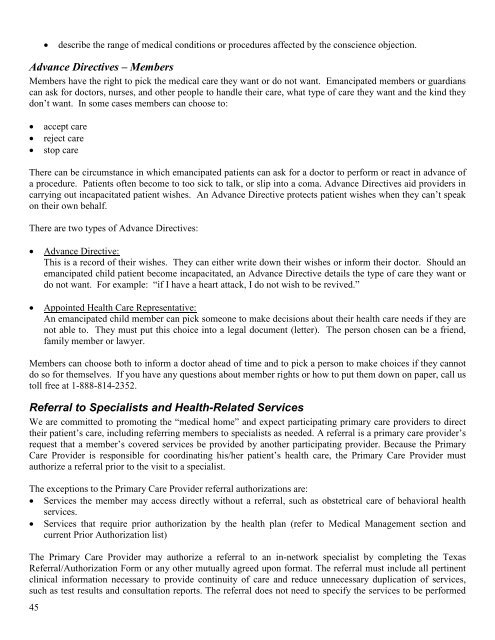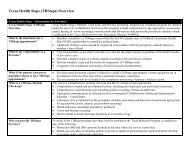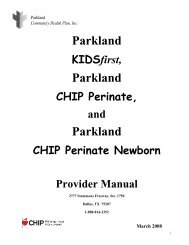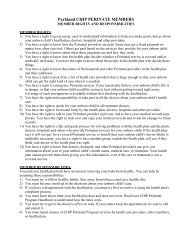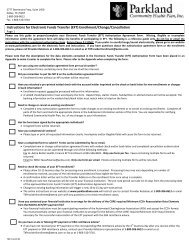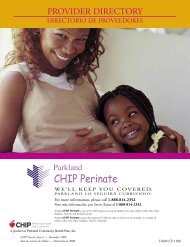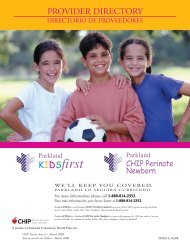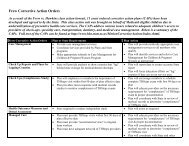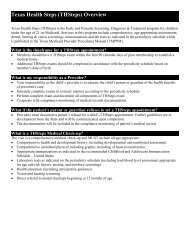PARKLAND HEALTHfirst - Parkland Community Health Plan, Inc.
PARKLAND HEALTHfirst - Parkland Community Health Plan, Inc.
PARKLAND HEALTHfirst - Parkland Community Health Plan, Inc.
Create successful ePaper yourself
Turn your PDF publications into a flip-book with our unique Google optimized e-Paper software.
45<br />
• describe the range of medical conditions or procedures affected by the conscience objection.<br />
Advance Directives – Members<br />
Members have the right to pick the medical care they want or do not want. Emancipated members or guardians<br />
can ask for doctors, nurses, and other people to handle their care, what type of care they want and the kind they<br />
don’t want. In some cases members can choose to:<br />
• accept care<br />
• reject care<br />
• stop care<br />
There can be circumstance in which emancipated patients can ask for a doctor to perform or react in advance of<br />
a procedure. Patients often become to too sick to talk, or slip into a coma. Advance Directives aid providers in<br />
carrying out incapacitated patient wishes. An Advance Directive protects patient wishes when they can’t speak<br />
on their own behalf.<br />
There are two types of Advance Directives:<br />
• Advance Directive:<br />
This is a record of their wishes. They can either write down their wishes or inform their doctor. Should an<br />
emancipated child patient become incapacitated, an Advance Directive details the type of care they want or<br />
do not want. For example: “if I have a heart attack, I do not wish to be revived.”<br />
• Appointed <strong>Health</strong> Care Representative:<br />
An emancipated child member can pick someone to make decisions about their health care needs if they are<br />
not able to. They must put this choice into a legal document (letter). The person chosen can be a friend,<br />
family member or lawyer.<br />
Members can choose both to inform a doctor ahead of time and to pick a person to make choices if they cannot<br />
do so for themselves. If you have any questions about member rights or how to put them down on paper, call us<br />
toll free at 1-888-814-2352.<br />
Referral to Specialists and <strong>Health</strong>-Related Services<br />
We are committed to promoting the “medical home” and expect participating primary care providers to direct<br />
their patient’s care, including referring members to specialists as needed. A referral is a primary care provider’s<br />
request that a member’s covered services be provided by another participating provider. Because the Primary<br />
Care Provider is responsible for coordinating his/her patient’s health care, the Primary Care Provider must<br />
authorize a referral prior to the visit to a specialist.<br />
The exceptions to the Primary Care Provider referral authorizations are:<br />
• Services the member may access directly without a referral, such as obstetrical care of behavioral health<br />
services.<br />
• Services that require prior authorization by the health plan (refer to Medical Management section and<br />
current Prior Authorization list)<br />
The Primary Care Provider may authorize a referral to an in-network specialist by completing the Texas<br />
Referral/Authorization Form or any other mutually agreed upon format. The referral must include all pertinent<br />
clinical information necessary to provide continuity of care and reduce unnecessary duplication of services,<br />
such as test results and consultation reports. The referral does not need to specify the services to be performed


